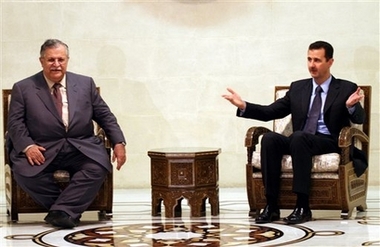Iraq president visits Syria
(AP)Updated: 2007-01-15 12:56
DAMASCUS, Syria - Syria's leader promised to help ease tensions in
neighboring Ira
q during Iraqi President Jalal Talabani's landmark visit to
Damascus on Sunday, just days after US President Bush accused Syria of backing
the Iraqi insurgency.
 Syrian President Bashar Assad, right, meets his Iraqi counterpart Jalal Talabani on Sunday, Jan. 14, 2007 at Ash-Shaeb presidential palace in Damascus. [AP]  |
A prominent Iraqi lawmaker with close ties to Talabani said the president's visit to Syria was not meant as a snub to Bush. The six-day trip had been planned for nearly a year and its date was finalized about two weeks ago, Kurdish lawmaker Mahmoud Othman said from Baghdad.
But he acknowledged that the timing "may seem a little tricky" after Bush's speech and said Iraq needed to follow its own foreign policy goals independent from Washington's agenda.
"Our interests differ from those of the United States," he said. "The enmity between the United States and Syria and Iran doesn't benefit the situation in Iraq."
Syria's official news agency SANA said the talks between Syrian President Bashar Assad and Talabani focused on "bilateral relations," and that both sides expressed a desire to strengthen ties between their countries. Assad also stressed Syria's readiness to help Iraq achieve national reconciliation and political stability to help end the increasing sectarian violence in the country, the state news agency said.
The United States and Iraqi officials accuse Damascus of providing refuge to Sunni insurgents and allowing them to cross the border freely into Iraq to fight American and Iraqi troops. In an address Wednesday outlining his new strategy for Iraq, Bush vowed to take military action to disrupt insurgent supply lines coming into Iraq from Syria and Iran.
Syria denies it is providing refuge to militants, countering that the Iraqis and their U.S. backers are not doing enough to guard their side of the border.
Iraq and Syria restored diplomatic relations late last year, more than two decades after they were cut over ideological disputes, Syria's support of Iran in its 1980-88 war with Iraq, and charges that Baghdad supported Syrian militants.
Talabani has been warmer toward Syria than Iraq's Shiite Prime Minister Nouri al-Maliki, who fears that giving the country's neighbors a role in ending the violence in Iraq would allow them to meddle in Iraqi affairs.
But Vali Nasr, a U.S.-based expert on Middle Eastern affairs and a fellow on the Council of Foreign Relations, said Iraq needs to independently engage its neighbors, even if it disagrees with some of them.
"The Iraqis must have their own plan for regional engagement and show that not everything is managed in Washington," he said.
Syria is a prime candidate for engagement in any regional outreach by Iraq.
Its close relations with Iran are a vital asset given Tehran's vast influence with Iraq's majority Shiite Muslims. It also has good relations with the once-dominant Sunni Arabs in Iraq and plays host to 800,000 or more Iraqi refugees, including stalwarts of Saddam's Baath Party known to be active in the Iraqi insurgency.
Muqtada al-Sadr, the anti-U.S. Shiite cleric whose Mahdi Army militia is blamed for much of Iraq's sectarian violence, was given a warm welcome by Assad when he visited Syria last year. Al-Sadr is one of al-Maliki's main political backers.
"Syria can play a constructive role in Iraq, but not necessarily a decisive one," said Rami Khouri, a Beirut-based Middle East expert. "What Syria can and can not do will not decide the future of Iraq, but it can help."
|
||
|
||
|
|